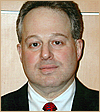
Richard Kitsis
Richard Kitsis, a 1980 graduate of the UCSF School of Medicine, was named chief of cardiology at Albert Einstein College of Medicine and Montefiore Medical Center in New York.
UCSF School of Medicine alumnus Richard Kitsis has been named chief of the Division of Cardiology at the Albert Einstein College of Medicine and its University Hospital, Montefiore Medical Center.
Kitsis received his bachelor's degree from Harvard University and his medical degree from UCSF. After completing his residency training at the Massachusetts General Hospital and at the Boston VA Medical Center, he was a fellow in Cardiology at Einstein/Montefiore and a post-doctoral research fellow at Einstein.
The appointment was announced recently by Dominick P. Purpura, MD, The Marilyn and Stanley M. Katz Dean of Einstein, and by Spencer Foreman, MD, president of Montefiore.
In conjunction with his new role, Kitsis becomes co-director of the Einstein-Montefiore Heart Center. He also will continue to serve in a variety of clinical research and teaching capacities at the two institutions.
A member of the Einstein faculty since 1991, Kitsis holds the Dr. Gerald and Myra Dorros Chair in Cardiovascular Disease and serves as professor of medicine and of cell biology, as well as director of the Einstein Cardiovascular Research Center at the medical school. He also is active in teaching on many levels within the College, including giving lectures in mammalian genetics, gene expression, molecular biology, signal transduction, cardiovascular physiology, and pathophysiology.
Among his clinical activities, Kitsis serves as attending physician in the Coronary Care Unit and on the Cardiology Consult Service at the Jack D. Weiler Hospital of the Albert Einstein College of Medicine (which is a division of Montefiore). And, as a researcher, he leads an internationally recognized research program focused on understanding fundamental molecular mechanisms of cell death and their role in heart disease and cancer.
Source: Albert Einstein College of Medicine

